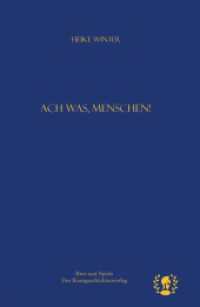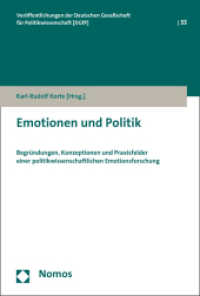- ホーム
- > 洋書
- > 英文書
- > History / World
Full Description
In 1906, the Sugar Maple Tree Song was just one example of the rhapsodic pieces that touted the Prairie West as the ""promised land"". In the formative years of agricultural settlement from the late nineteenth century to the First World War, the Canadian government, along with the railways and other Prairie boosters, further developed and propagated this image within the widely distributed promotional literature that was used to attract millions of immigrants to the Canadian West from all corners of the world.
Some saw the Prairies as an ideal place to create a Utopian society; others seized the chance to take control of their own destinies in a new and exciting place. The image of the West as a place of unbridled prosperity and opportunity became the dominant perception of the region at that time. During the interwar and post-World War II eras, this image was questioned and challenged, although not entirely replaced, thus showing its pervasive influence.
The Prairie West as Promised Land is group of essays, which includes contributions from some of the best-known Prairie historians as well as some of the most promising new scholars in the field, explores this persistent theme in Prairie history and makes an important contribution to the historiography of the Canadian West.
Contents
The Promise of the West as Settlement Frontier. Adventurers in the Promised Land: British Writers in the Canadian North West, 1841-1913. Canada's Rocky Mountain Parks: Rationality, Romanticism, & a Modern Canada. Clifford Sifton's Vision of the Prairie. "We Must Farm to Enable Us to Live": The Plains Cree & Agriculture to 1900. Utopian Ideals & Community Settlements in Western Canada, 1880-1914. "Land I Can Own": Settling in the Promised Land. The City Yes, The City No: Perfection by Design in the Western City. Land of the Second Chance: Nellie McClung's Vision of the Prairie West as Promised Land. The Kingdom of God on the Prairies: J.S. Woodsworth's Vision of the Prairie West as Promised Land. "A Far Green Country Unto a Swift Sunrise": The Utopianism of the Alberta Farm Movement, 1909-1923. "No Place for a Woman": Engendering Western Canadian Settlement. Preaching Purity in the Promised Land: Bishop Lloyd & the Immigration Debate. Policing the Promised Land: The RCMP & Negative Nation-Building in Alberta & Saskatchewan in the Interwar Period. Uncertain Promise: The Prairie Farmer & the Post-War Era. The Artist's Eye: Modernist & Postmodern Visualizations of the Prairie West. The Dream Still Lives: Promised Land Narratives during the Saskatchewan Golden Jubilee. From Farm to Community: Co-operatives in Alberta & Saskatchewan, 1905-2005.








